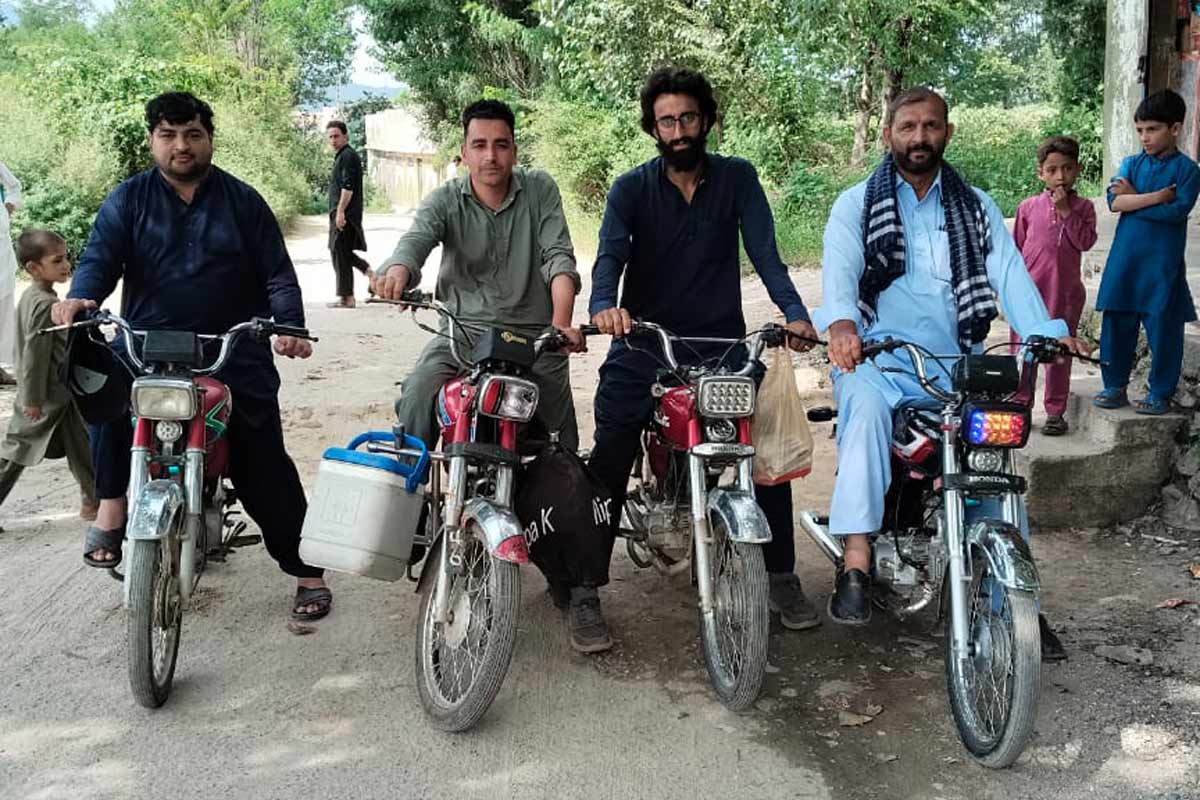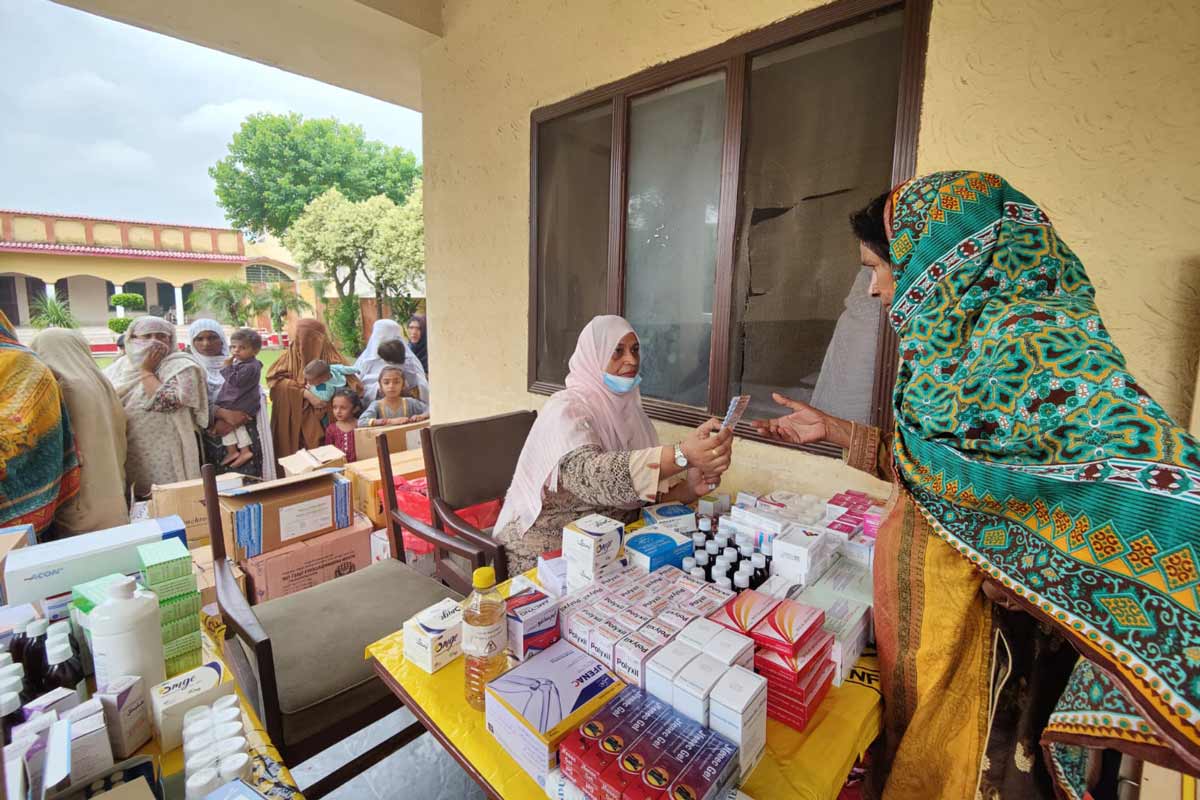How Karachi and Hyderabad outsprinted typhoid
This May, Sindh Province in Pakistan embarked on a two-week campaign to deliver typhoid conjugate vaccine (TCV) to nearly 9 million children at risk from an increasingly drug-resistant bacterium. Rahul Basharat found out how they did it.
- 31 July 2024
- 7 min read
- by Rahul Basharat Rajput
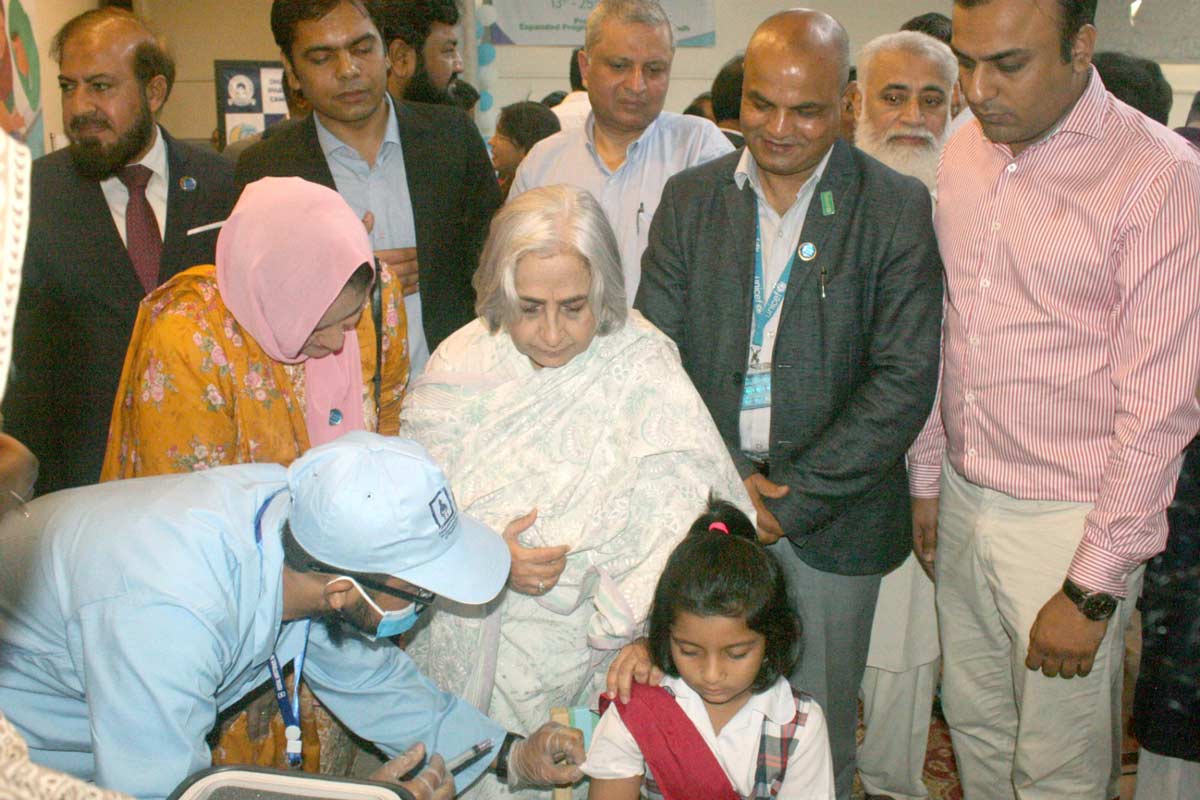
It was the middle of a late May afternoon and the temperature in Karachi, a coastal city in southern Pakistan, was already tipping 35 degrees Celsius. Summer was coming, and the sun would soon grow hotter over the city’s 18 million inhabitants.
Despite the sweltering weather, Muhammad Basit was hard at work. A vaccinator in the Sindh Provincial Health Department, stationed at a tehsil hospital in the east of the city, Basit was one of 6,500 vaccinators staffing the frontline of an ambitious emergency typhoid vaccination campaign rolling out in Karachi and Hyderabad.
“Typhoid is a serious disease. [...] Unhygienic conditions and unclean water are factors behind this illness, so my living circumstances do not allow me to not vaccinate my child with the vaccine.”
- Tehmina Khawar, mother to ten-month-old Hassan
Launched on 13 May, the goal was to immunise 8.94 million children aged between nine months and 15 years against the increasingly drug-resistant bacterial infection by 25 May.
A majority of the eligible children were to be reached through outreaches, but even Basit’s ‘fixed site’ vaccination centre was aiming to protect 105 of them each day. Ten days in, he said his team had been able to reach between 74 and 84 children each day – short of target, but then the hot weather is known to have a dampening effect on turnout. “The number is encouraging, even though the mercury was rising every day,” Basit said.
Elsewhere across the two cities, colleagues of Basit’s, likewise armed with doses of the typhoid conjugate vaccine (TCV), immunised children in health centres, at schools, at outreach sites in informal settlements, and on doorsteps.
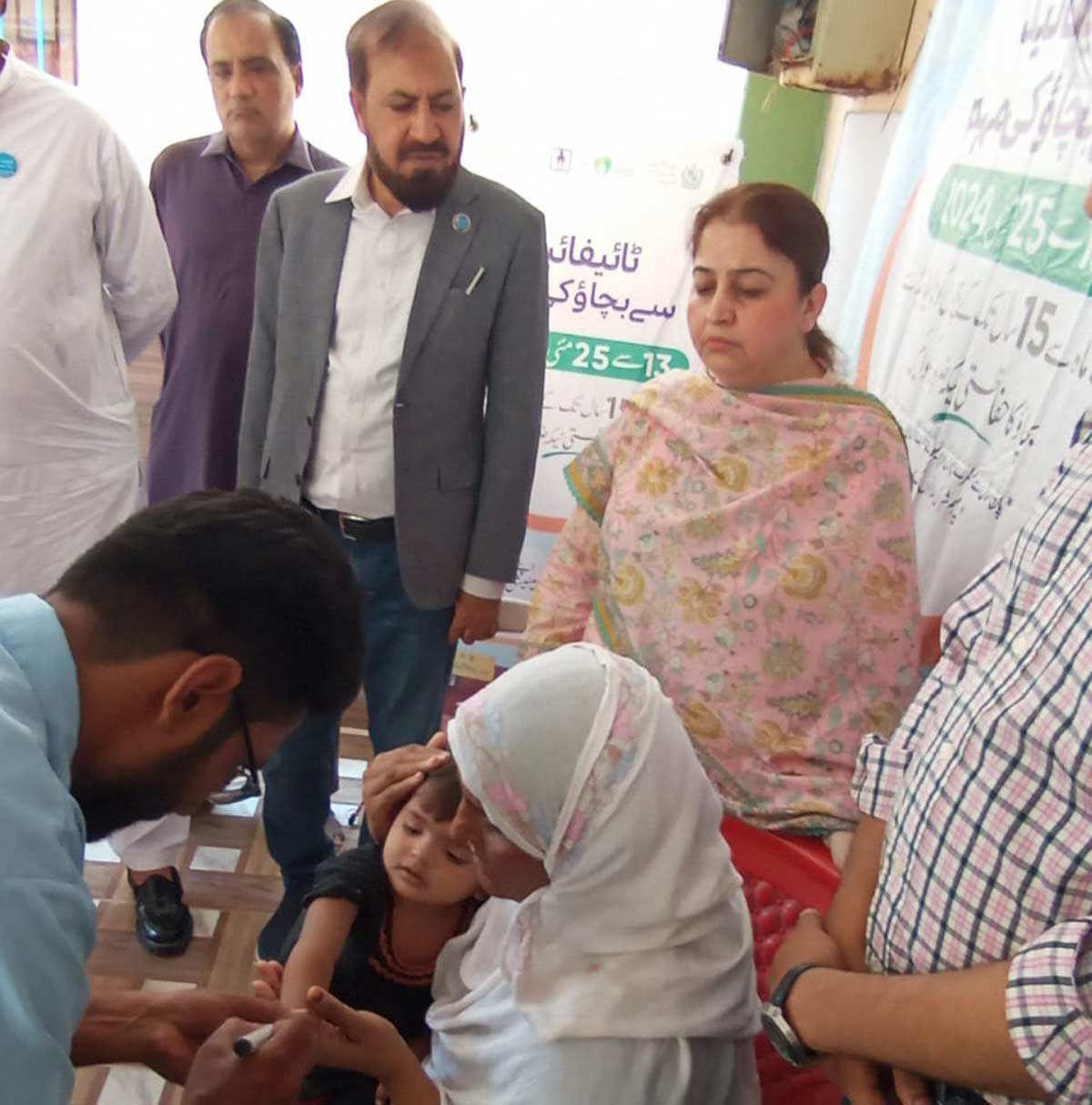
Typhoid rising
Dr Muhammad Naeem, Director of Sindh’s Expanded Programme on Immunization (EPI), explained that the emergency campaign was spurred by an increasing number of extensively drug-resistant (XDR) typhoid fever cases among children in the two cities over the past few years. He said the health department reported over 5,000 typhoid cases in Karachi and Hyderabad cities last year.
Caused by Salmonella Typhi, typhoid spreads in contaminated food and water and is a major public health challenge in, mainly, lower-income countries where access to clean water and good sanitation is limited. The World Health Organization (WHO) estimates that, worldwide, 110,000 people die of the disease each year.
In Pakistan, the pathogen’s threat is exacerbated by especially high rates of antimicrobial resistance (AMR), meaning that the bacterium has evolved immunity to most of the common treatments. Karachi is a national epicentre for XDR typhoid, which is invulnerable to five antibiotics, with as many as 14,360 confirmed cases reported between early 2017 and mid-2021, according to the National Institutes of Health, Islamabad. Moreover, experts agree that the XDR variety of typhoid is its predominant form here. Given that Karachi is a major transit hub, the threat to neighbouring areas and countries is high.
According to Dr Naeem, antibiotic resistance has notched up since COVID-19, which prompted the ‘excessive use’ of antimicrobial treatments.
Children are the worst-affected demographic. In fact, in 2017, 63% of typhoid cases and 70% of typhoid deaths in Pakistan were among children younger than 15 years of age.
To cope with the swelling public health challenge, Pakistan in 2019 became the first country in the world to introduce the WHO-recommended TCV into its routine immunisation programme.
“Vaccination is really a cost-effective way to tackle AMR ,” Gavi epidemiologist Allyson Russell told VaccinesWorkin 2022. Parts of Pakistan in which TCV coverage is high have seen rates of XDR typhoid go into retreat, she noted.
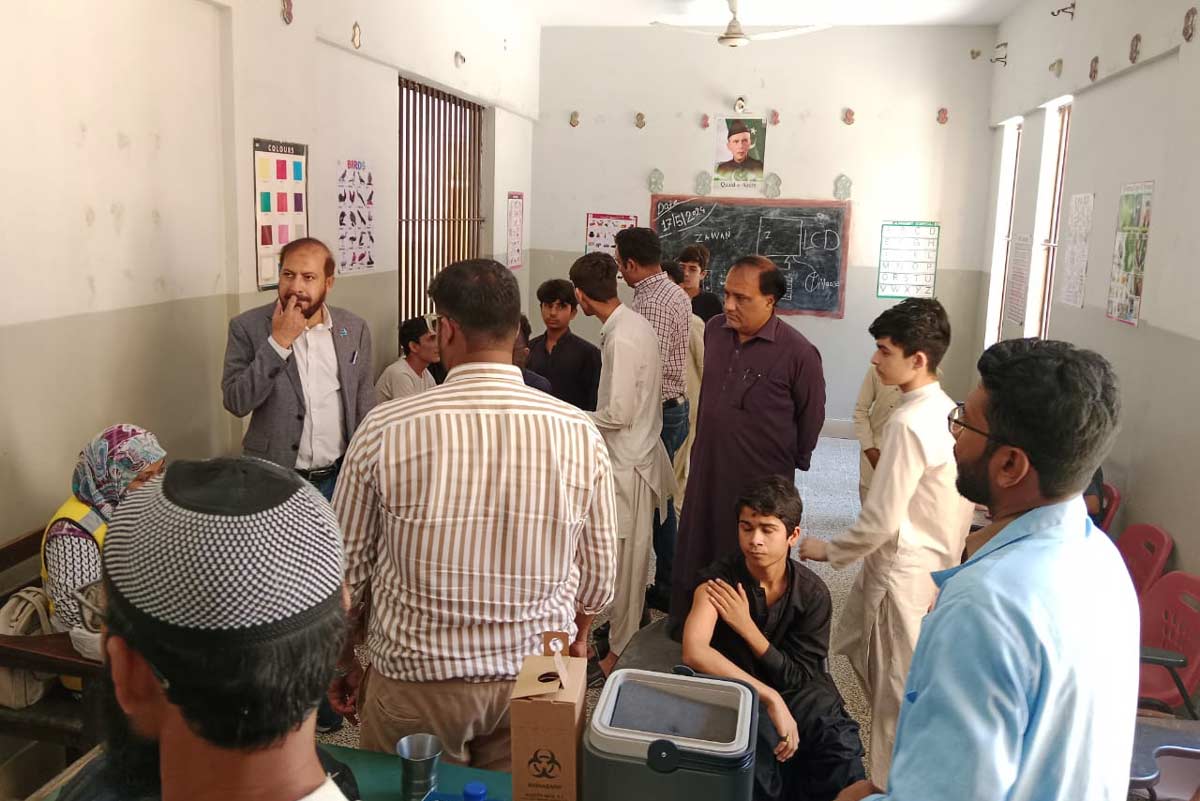
In Sindh, a previous large-scale TCV campaign conducted in 2019, at the time of the introduction of the vaccine, reached well over 8 million people in the urban areas. But since 2021, typhoid cases have been on the rise, more steeply in Sindh than in other parts of the country, due to a number of factors – such as lack of access to safe water and sanitation, low routine vaccine coverage, large population movement into the urban areas, and drug resistance. In the first part of 2023 , accelerating spread was noted again – and again particularly in Sindh – prompting the government to launch the emergency campaign.
“An essential opportunity”
Muhammad Aamir, an accountant, had learned of the emergency typhoid immunisation campaign on social media. Now, on a wooden bench outside the vaccination room at the tehsil hospital in Karachi’s District East, he waited with his two-year-old son, Muhammad Haris.
Aamir considered the public TCV roll-out an “essential” opportunity to protect the child. Sanitation conditions and access to clean water are “far from ideal” across the city, Aamir said – especially in District East.
“Vaccinating at a private hospital is quite expensive for me, so I came to this government-run hospital in this residential area to get my son’s jab of TCV,” he told VaccinesWork.
Aamir’s views were echoed by Tehmina Khawar, an IT professional who had brought her ten-month-old son, Hassan Khawar, for the typhoid-blocking shot.
As she left the vaccination centre with her son in her arms, she explained that maintaining a clean environment and getting safe water in a populous city like Karachi is a distant dream. As it is, her son is frequently ill. “Hassan suffers from diarrhoeal and fever illness, and almost every month I take him to the physician and get medicine for him,” said Khawar.
She said the doctor’s advice has been to provide hygienic conditions and a healthy diet to Hassan, but as the sanitation situation in her vicinity is bad, she finds she is unable to protect him from environmental contagions.
“Typhoid is a serious disease that can cause death. While unhygienic conditions and unclean water are factors behind this illness, so my living circumstances do not allow me to not vaccinate my child with the vaccine,” she added.
Exam fever?
Commenting on the TCV drive in Karachi and Hyderabad, Dr Abdul Ghafoor Shoro, Secretary-General of the Pakistan Medical Association – the country’s largest body representing physicians – emphasised the significance of such campaigns in large cities like these and explained that, strategically, timing has a major impact on turnout.
Kicking off the campaign ahead of the hottest days of summer, and before schools closed for holidays, was strategically key. Exams, too, could work against turnout: “If any child gets a temperature after vaccination during exams, it creates a negative impact and leads to the parents' refusal of vaccination,” said Dr Shoro. To get ahead of these concerns, the EPI Department had worked closely with schools to make sure each child had the opportunity to be vaccinated, and had also instituted a robust system to record and manage any side effects or adverse events following vaccination.
But even in May, 5-6% of schools had already either closed or entered into exam period, Dr Naeem said – a challenge that vaccinating teams needed to work around by scheduling special post-exam vaccination sessions.
Parental refusals remain a challenge, said vaccinator Muhammad Basit. But he believes that continuous and effective awareness campaigns and learnings from COVID-19 vaccination drives have helped convince many who did not previously understand the importance of vaccinations for better health.
Have you read?
95% protected
According to Dr Naeem, the health department was successful in vaccinating 95% percent of the target population in the 12-day drive.
According to the official figures received from the provincial EPI by VaccinesWork, out of the 8.94 million children who were eligible for immunisation, 48% were reached in community outreaches, 24% at outreach sites, 14 % at fixed sites, 12% at schools and 2% by mobile teams.
During the drive, 249 union councils in seven districts of Karachi and one district of Hyderabad were covered. Naeem said that achieving 95% of the target during the emergency campaign would significantly reduce the burden of typhoid cases. However, further efforts would be made to improve TCV’s use as part of routine childhood vaccination, he said.
Meanwhile, Sindh Health Minister Dr Azra Fazal Pechuhu said in a statement that the top priority of the government is to ensure that all eligible children are protected from typhoid – to which end vaccination is “critical”.
More from Rahul Basharat Rajput
Recommended for you




